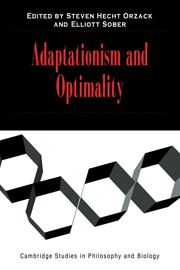Book contents
- Frontmatter
- Contents
- Contributors
- Acknowledgments
- Introduction
- 1 A Likelihood Framework for the Phylogenetic Analysis of Adaptation
- 2 Adaptation, Phylogenetic Inertia, and the Method of Controlled Comparisons
- 3 Optimality and Phylogeny: A Critique of Current Thought
- 4 Fit of Form and Function, Diversity of Life, and Procession of Life as an Evolutionary Game
- 5 Optimality and Evolutionary Stability under Short-Term and Long-Term Selection
- 6 Selective Regime and Fig Wasp Sex Ratios: Toward Sorting Rigor from Pseudo-Rigor in Tests of Adaptation
- 7 Is Optimality Over the Hill? The Fitness Landscapes of Idealized Organisms
- 8 Adaptation, Optimality, and the Meaning of Phenotypic Variation in Natural Populations
- 9 Adaptationism, Optimality Models, and Tests of Adaptive Scenarios
- 10 Adaptation and Development: On the Lack of Common Ground
- 11 Three Kinds of Adaptationism
- 12 Adaptation, Adaptationism, and Optimality
- Index
12 - Adaptation, Adaptationism, and Optimality
Published online by Cambridge University Press: 06 January 2010
- Frontmatter
- Contents
- Contributors
- Acknowledgments
- Introduction
- 1 A Likelihood Framework for the Phylogenetic Analysis of Adaptation
- 2 Adaptation, Phylogenetic Inertia, and the Method of Controlled Comparisons
- 3 Optimality and Phylogeny: A Critique of Current Thought
- 4 Fit of Form and Function, Diversity of Life, and Procession of Life as an Evolutionary Game
- 5 Optimality and Evolutionary Stability under Short-Term and Long-Term Selection
- 6 Selective Regime and Fig Wasp Sex Ratios: Toward Sorting Rigor from Pseudo-Rigor in Tests of Adaptation
- 7 Is Optimality Over the Hill? The Fitness Landscapes of Idealized Organisms
- 8 Adaptation, Optimality, and the Meaning of Phenotypic Variation in Natural Populations
- 9 Adaptationism, Optimality Models, and Tests of Adaptive Scenarios
- 10 Adaptation and Development: On the Lack of Common Ground
- 11 Three Kinds of Adaptationism
- 12 Adaptation, Adaptationism, and Optimality
- Index
Summary
Whatever their other differences, Aristotle, Darwin, and creationists agree that animals and plants are adapted: that is to say, they are appropriately organized for those functions that enable them to survive and reproduce. What does this statement mean? In other words, how can one establish its truth, or its relevance, in any given instance? A related question is: Does the presence or prevalence of adaptation imply that organisms are optimally adapted for their ways of life? These questions would keep even an elephant's child busy for a few minutes.
Adaptation plays an oddly ambivalent role in biological thought. D'Arcy Thompson (1942, 950) remarked that the assumption of adaptedness is an indispensable guide for forming hypotheses about how organisms work. In the same book, he sharply criticized his contemporaries' invocation of natural selection as a deus ex machine used to justify adaptive explanations without either demonstrating the adaptedness or investigating the mechanisms by which the supposed adaptations could or did evolve (D'Arcy Thompson 1942, pp. 8n, 960). He found this approach as useless as the natural theology it replaced; substituting natural selection for God as the omnipotent agent of adaptation is not science.
D'Arcy Thompson's ambivalence has become full-blown controversy. Like him Gould and Lewontin (1979) objected to the haphazard way that adaptive explanations are invoked, bereft of attempts to refute them, in the name of omnipotent natural selection. Gould and Lewontin, however, also objected to using the presumption of adaptedness as the exclusive guide for forming hypotheses about organismic structure and function.
- Type
- Chapter
- Information
- Adaptationism and Optimality , pp. 358 - 388Publisher: Cambridge University PressPrint publication year: 2001
- 3
- Cited by



